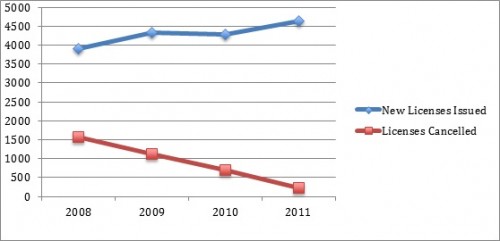Most small businesses don’t start off with a plan. They just open their doors and hope for the best.
Along the way they find that the key to their success is to eventually develop a strong business plan to keep their shop doors open.
In Arizona, small businesses have increased more than 30 percent in the past 10 years, according to the Arizona Commerce Authority (ACA), an organization created by Gov. Jan Brewer in 2010.

Even though there was an increase of small businesses over the past 10 years, during the recession, there was a 1.5 percent decrease in small business development.
A business in Safford, Ariz. is one example of a business that defied the trend during the recession.
Sorellas Elite Fashion first opened its doors at the start of the recession in 2008, and are now celebrating its forth year as a successful business. Most small businesses have trouble staying open longer than three.
“Most businesses fail in the first three years,” said Ernie Webster, the manager of the Small Business Utilization Program at the University of Arizona.
The Small Business Utilization Program helps small businesses throughout Arizona by offering them networking opportunities and advise on the necessary steps to sustain a successful business.
Rachel Peck, one of the Sorellas Elite Fashion’s owners, said her mother’s first thought was “ ‘Oh, please, girls, you don’t know what you’re doing.’ But when she saw our passion for it and how serious we were, she knew she had to get involved.”
This is just one example of a business that was able to withstand the three-year fail period because of the owners’ passion, and skills within their specialty market.
Peck said that their business plan when they started was to market themselves through promotions and to through social networking.
“You’ve got to make it work, you can’t wait for people to come to you,” said Peck.
“Social networking has been their biggest help,” she said.
Now as an established business they continue to focus on their new clothing line and promote their shop with a variety of events that include sales, fashion shows and giveaways.
According to Webster, one of the top things that help make a successful small business is knowledge about the products the business is selling and or using in their store. He also says researching your competition, researching more about your products, and knowing your competition’s prices to undercut them help bring in more people and therefore more money. It is also important to have a short-term and long-term business plan.
Webster considers a short-term business plan to be a plan of six to 12-month layout of where you want your business to financially be as well as your goal of financial gains. A long-term plan is the same plan but for up to at least five years. These plans help businesses learn what is working and what is not working.
Webster believes money is one of the most important things for a business to stay alive. It is always safe to have around $50,000 saved for any problems that occur, as well as any costs that they can pay for with revenue.
Money is a main factor in causing businesses to flop. But there are other factors as well.
“If you’re not being flexible and adaptable you’re not going to last very long,” said Lisette DeMars, the Tucson membership coordinator for Local First Arizona.
Local First Arizona is a statewide, non-profit organization that works to help small businesses success. It educates businesses and their owners about how local businesses can work together to bring money back to the communities’ economy.
The top contributors to business failures are: bad location, inability to deal with the shifts in the economy, and lack of funds, said DeMars. Many other factors can bring a business to failure.
For example, owners of long time Tucson toy store, Mrs. Tiggy Winkles, were unable to adjust to the harsh economic times. Parents shopping habits shifted. They were no longer looking for high-end toys. Parents could get quality toys from chain stores.
“Mrs. Tiggy Winkles had a long history of challenges that built up over time,” said DeMars, who worked at the store. “We just couldn’t shake them completely. The economy was enough for us to tip the ship.”
According to Marshall Vest the director of the Economic and Business Research Center at the UA, the economy is recovering from the recession. Specifically in Tucson, there is an increase of business licenses and a decrease of business license cancellations, according to Vest’s research.
Vest said “employment is growing significantly,” not specifically in small businesses but in all businesses in Tucson. There was a large loss of about 30,000 jobs during the recession, meaning about one in 11 jobs “just disappeared” during this time.
Within the past 12 months there have been about 4,000 jobs created in Tucson, many of which were developed by the increase of small businesses opening.
In Coconino County Scott Neuman, the program coordinator for the Coconino County Community Services Department (CCCSD) works with many businesses in the area to help them grow.
The CCCSD created a Citizen Empowerment & Community Engagement (CECE) division to help individuals gain self-sufficiency. According to Neuman, more than 70 percent of people in the U.S. have considered starting their own business, but don’t because they just don’t know how. So, CECE helps these people create their businesses by offering them business development programs.
In Graham County the Small Business Development Center assists small businesses through Eastern Arizona College. Statewide these development centers work through community colleges. They’re funded by a grant through the U.S. Small Business Administration, which enables them to offer their services at little to no cost.
The SBDC checks in on what their community needs most and offers services based on what businesses need the most. Among their services they offer one-on-one counseling as well as seminars.
Without these development programs throughout Arizona, many small businesses would be unable to start, and stay afloat.








